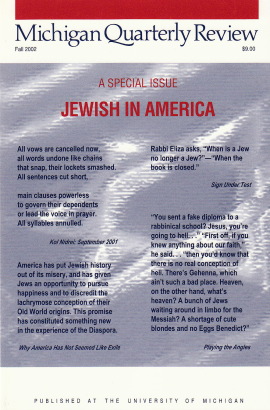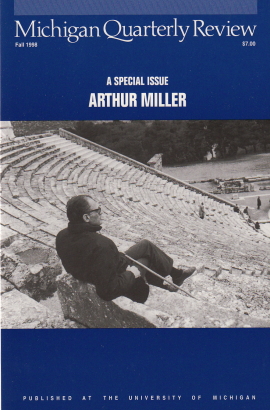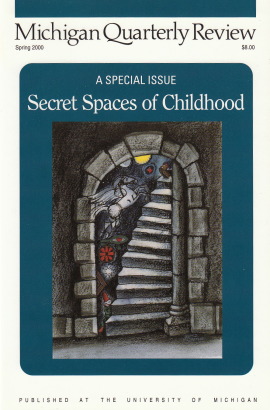
Jewish in America, Vol. I
Edited by Sara Blair and Jonathan Freedman
This issue of MQR brings together academic essays, high-level journalism, personal narratives, fiction, poetry, and visual art responding to the transformations of Jewish experience in the United States during the last fifty years, and, speculatively, extending into the twenty-first century. We offer writings that respond to the multiplicity of representations, cultural forms, fashionings and refashionings, that have defined the experience of Jews in America and continue to compel debate. These include works by Jews and non-Jews that engage contemporary controversies in the fields of politics, sociocultural dynamics, the arts, and the relation of Jewish life in America to other historical periods, other geographical places.
Contents of this issue include:
Fiction: Sara Blair and Jonathan Freedman introduce a section of “Drashes” or short interpretive essays on some aspect of Jewish-American culture by Leonard Barkan, “Merchants of Venice,” Herbert Gold, “Religion: Goy,” Pearl Abraham, “If Only: Finding America in Hasidism,” Louis Simpson, “The Jew’s House,” Stephen Greenblatt, “A Eulogy,” Gregory Orfalea, “Valley Boys” [on Daniel Pearl], and John Limon, “Don Rickles and Death”. A memoir by Robert A. Rosenstone, “Izzy the Red,” about his family and the romance of American communism. “Intifada Diptych,” by Alisa Solomon, an essay on the Israeli-Palestinian conflict and its significance for American Jews. “While Waiting for the Ferry to Cuba,” by Ruth Behar, an essay about the making of her film Adio Kerida on the Jewish community in Cuba. “Why America Has Not Seemed Like Exile,” by Stephen J. Whitfield, a study of the presence of Jewish culture in America, with plentiful examples of successful assimilation and ascendancy.
Fiction: Sharon Pomerantz and Gerald Shapiro.
Poetry: Charles Bernstein, Daniel Mark Epstein, Leonard Nathan, Jacqueline Osherow, Robert Pinsky, Esther Schor, Grace Schulman.
Reviews: “Arguing (What Else?) About Jewish-American Poetry,” by Laurence Goldstein, on the anthologies and scholarship that seek to canonize a tradition.



